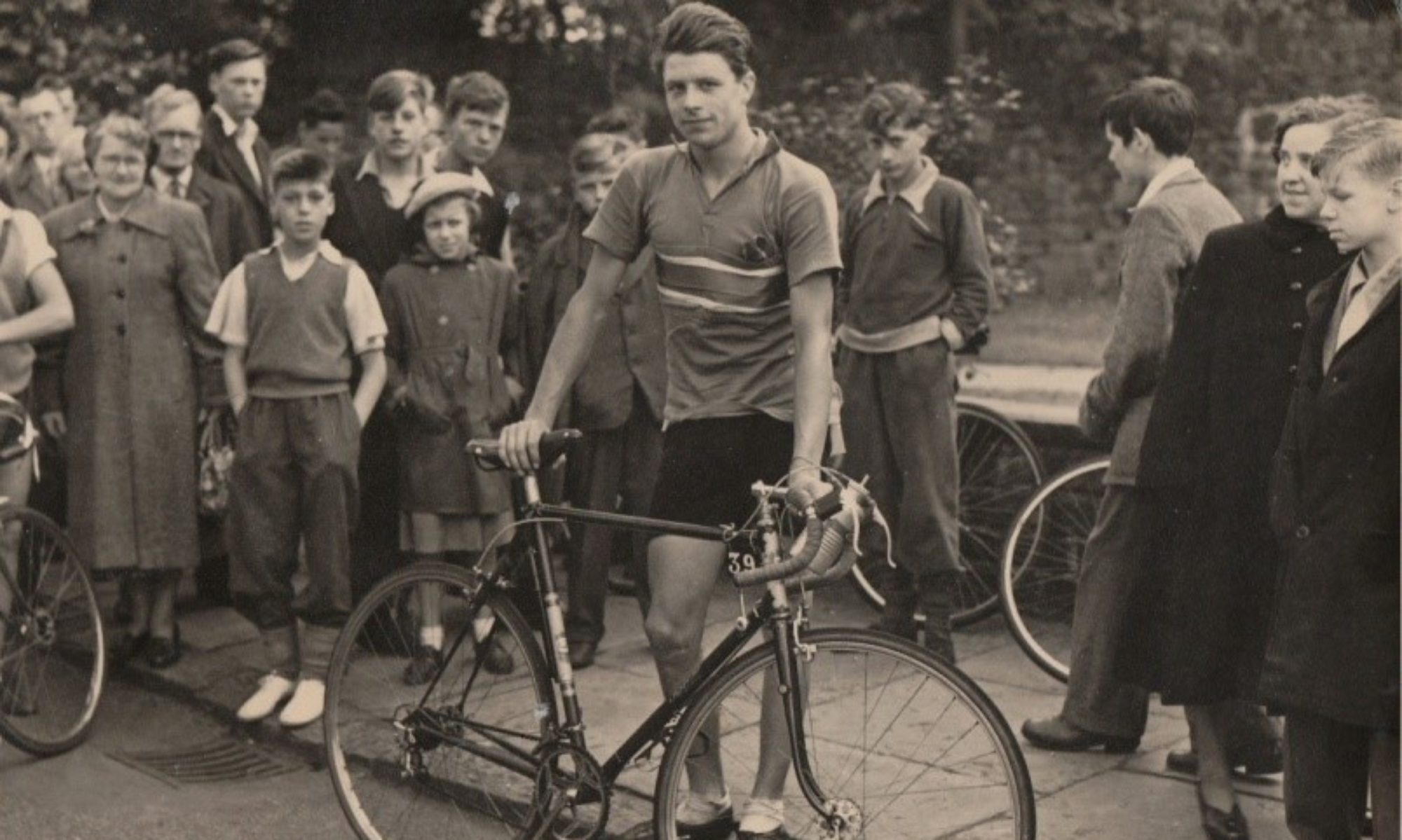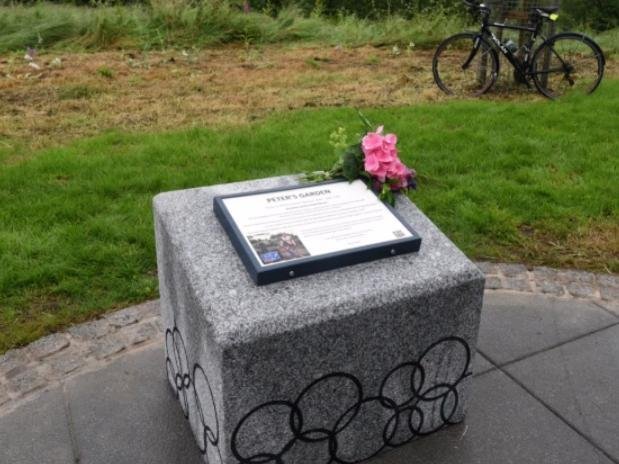
‘Peter’s Garden’ in honour of Peter Rimmer Ward
Architect of the Guild Wheel
Peter was a dynamic character believing nothing was impossible. A former international cyclist, he began cycling at the age of 16, often borrowing a bike to go out on club runs. Initially he joined Leyland Clarion Cycling Club, before he and four other cyclists formed The Ribble Valley Cycling Club in 1951. Shortly after Peter won his first race at the age of 18, wearing a football shirt with a blue band stitched across the front.
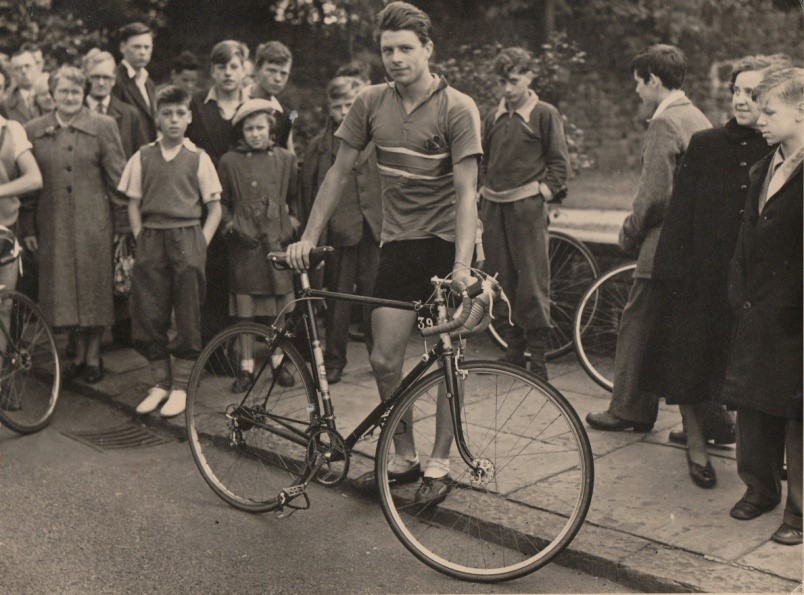
Nothing could stop Peter’s competitive spirit. When he was conscripted to do his National Service in the RAF, posted to the South of England, he would ride home to Lostock Hall to see his future wife Nora Critchley and back to barracks in a weekend. Luckily the RAF spotted Peter’s talent for racing in a televised event and from then on gave him all the privileges of riding for the RAF team.
Peter’s time in the RAF led him to become an engineer at British Aerospace, at both Warton and Strand Road sites, a job he never tired of. He continued racing to an international level, riding for England during the 50s and 60s. His proudest moment was winning the stage into Morecambe in the 1956 Tour of Britain, Peter enjoyed bringing the yellow jersey home to Lancashire.

Peter won over 30 first class races and organised many top-class racing events including the International Grand Prix of Leyland, an 80-mile gruelling road race attracting some of the top UK and European road cyclists. Once described as the ‘Sterling Moss’ of cycle racing as both sportsmen were notorious for racing hard and crashing often! Peter’s racing history leaves a captivating list of events:
1955 – In the Amateur Circuit of Britain, away in a leading group of riders on the next to the last stage and race leader on the road, he was brought off his cycle by the leading riders’ team car.
1956 –Peter finished four seconds behind Ericol Baldini in the Isle of Man International. Won the National Championships but was disqualified. Crashed and broke his wrist in the Tour Sweden.
1957 –In the National Championships, Peter finished fourth. After being in a breakaway for 100 miles he was caught four miles from the finish.
1959 – In the Tour of Britain, in 7th position, his forks broke, on the only part of the whole 1,000 mile course that service cars were instructed to by-pass. He then devoted his energies to the team. This regional team, at the finish, beat all the national teams and had riders in 1st, 4th and 8th positions.
1961 – Peter crashed on the 7th stage, when lying in fourth position in the Tour of Britain.
1962 – In the London to Holyhead 257 mile race, Peter was leading 8 riders away, with half a mile to go, John Geddes’ crank broke and he fell in front of Peter, causing him to crash.
The 1961 Tour of Britain crash led Peter, whilst recovering from serious injury, to write the iconic cycling handbook ‘The King of Sports’, termed the ‘Encyclopaedia of cycling’ by international cyclist Les West and the book was sold throughout the world.
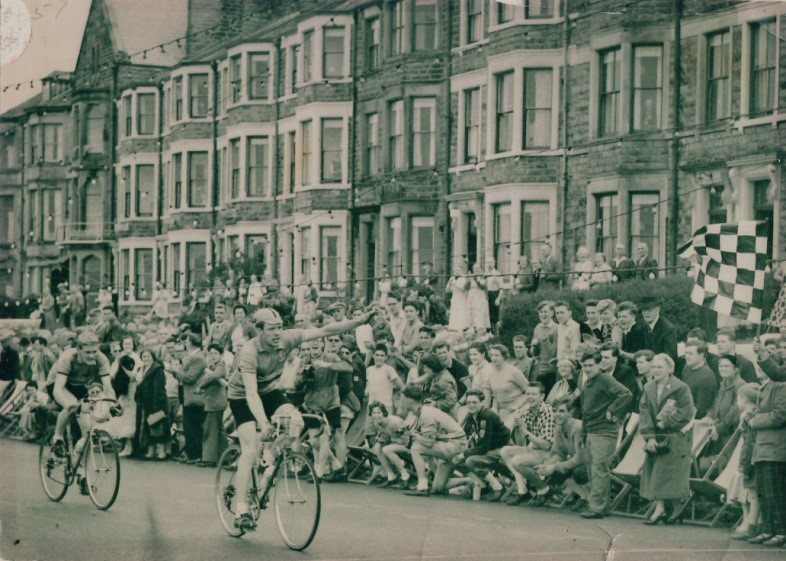
He continued to use his experience to encourage younger riders into cycling and wrote:
“To the younger riders I would say: learn to like cycling for itself, for the beautiful countryside you can see, for the good companionship and for its health economy and peacefulness. From the elation you feel at the top of a big hill you have climbed to the scalp tingling speed of the descent. Cycling can be all fun, all adventure. It can bring personal achievement and fitness that can never be found in a stuffy car or on a noisy motor scooter.”
Peter Ward – King of Sports
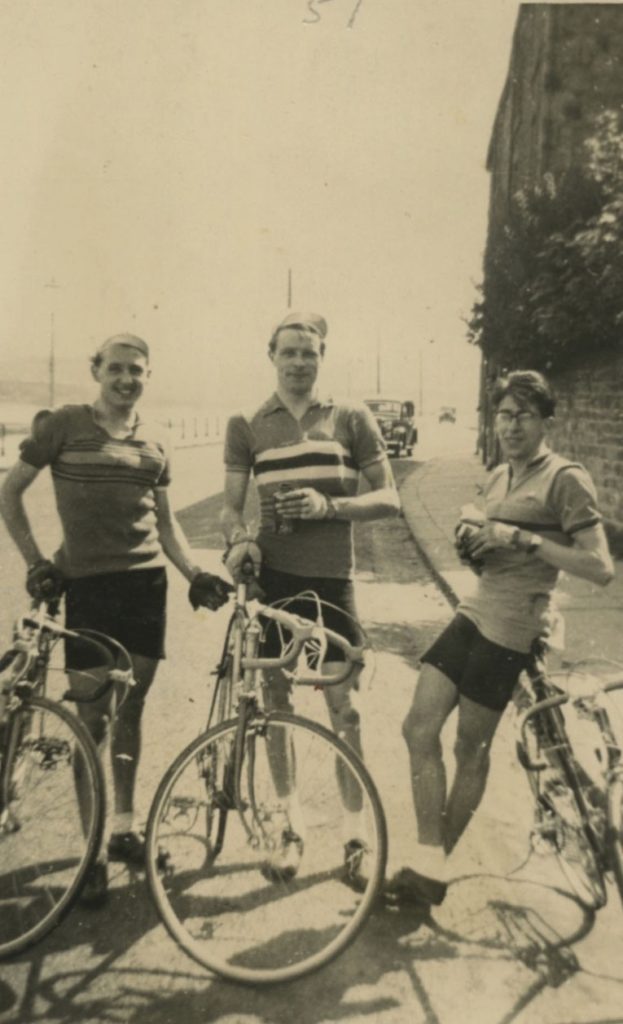
Peter used to cycle a round trip of 24 miles to work at BAE, virtually every day throughout his working life. After retirement he continued to instigate and be involved in creating new safer cycling routes to BAE systems. His idea of establishing a comprehensive cycle route network in Lancashire, led to him to become the architect of the iconic Guild Wheel. Peter spent years developing the 21-mile orbital greenway around the city, providing safe, scenic and healthy cycling around Preston. His dream was realised in 2012. Now over 100,000 people a year use the Guild Wheel for walking, running, cycling and commuting to work or school. It provides a safe route for the most vulnerable road users.
Peter served as an elected Labour City Councillor for over 30 years, including Chair of Housing, tackling deprivation, health issues, poverty and other inequalities.

Peter became a Trade Union representative at British Aerospace for the Warton site. Eventually, he was elected as National President of Trade Union TASS (now Unite), enabling him to play a major role in campaigning for workers’ rights. He was elected as Trustee of BAE Pension fund and worked tirelessly for better pensions for his fellow workers. Peter’s knowledge and experience led him to writing the book, ‘The Great British Pensions Robbery.’ Barbara Castle wrote this was of, ‘special importance to women.’
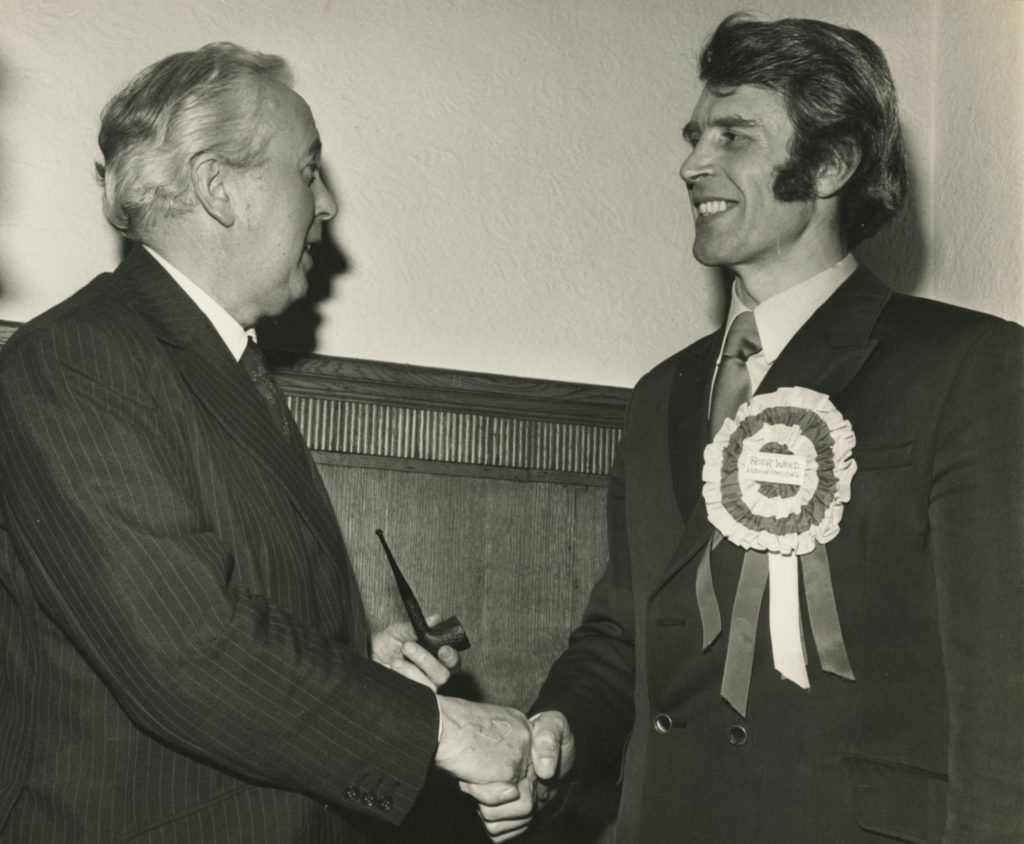
Peter served as a Justice of the Peace at Preston Magistrates Court for over 40 years. He was made a Guild Burgess in 2012 and had been involved in recent Preston Guilds, including commissioning in 1992 the sculpture of the 1842 martyrs outside Preston’s Corn Exchange.The placing of the memorial is a reminder now and in the future that, “Never without sacrifice, have gains been made towards justice and democracy.”
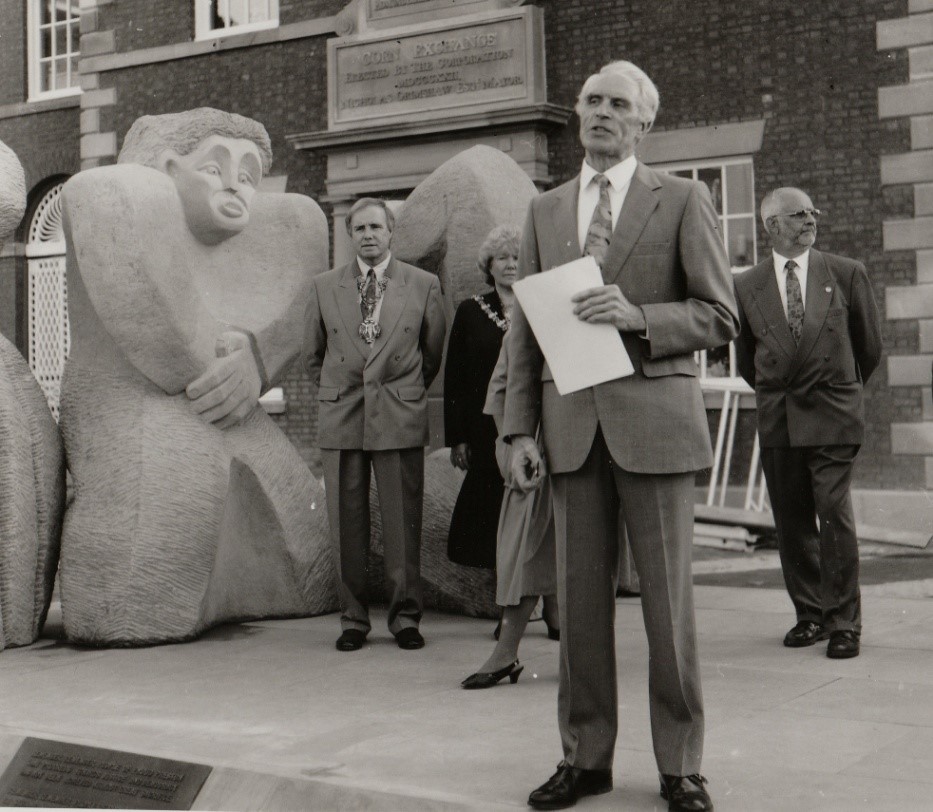
In 2012 Peter was awarded an MBE for his services to cycling. His legacy, the highly acclaimed Guild Wheel, took 12 years to come into fruition and is embraced by the people of Preston as the ‘Jewel in Preston’s crown.’
Brian Cookson, former President of Union Cycliste International (UCI), described Peter as one of the most influential people in his life recalling, “We had great times on the bike, training and racing, and many fascinating discussions on the way. Those were part of my formative years and I will never forget them. Quite simply Pete helped me raise my aspirations in life because he always had the attitude that if you wanted something improved or changed then it was up to you to contribute to that change. So, I can say in all honesty that I would never have begun the journey that led to me becoming UCI president if I hadn’t known Pete. For me it was a privilege to have known him.”

Peter Ward sadly died in 2017, five years after the Guild Wheel was opened.
In 2021 a memorial to Peter was created on the Guild Wheel near Fernyhalgh Lane, it is called Peter’s Garden.
Peter’s Garden is a natural wildflower garden with trees, benches and a granite stone plaque in memory.
Preston City Mayor Javed Iqbal said at the opening ceremony, ‘I am truly honoured to open this fitting memorial to Peter Ward. A man who’s passion for cycling knew no bounds’.
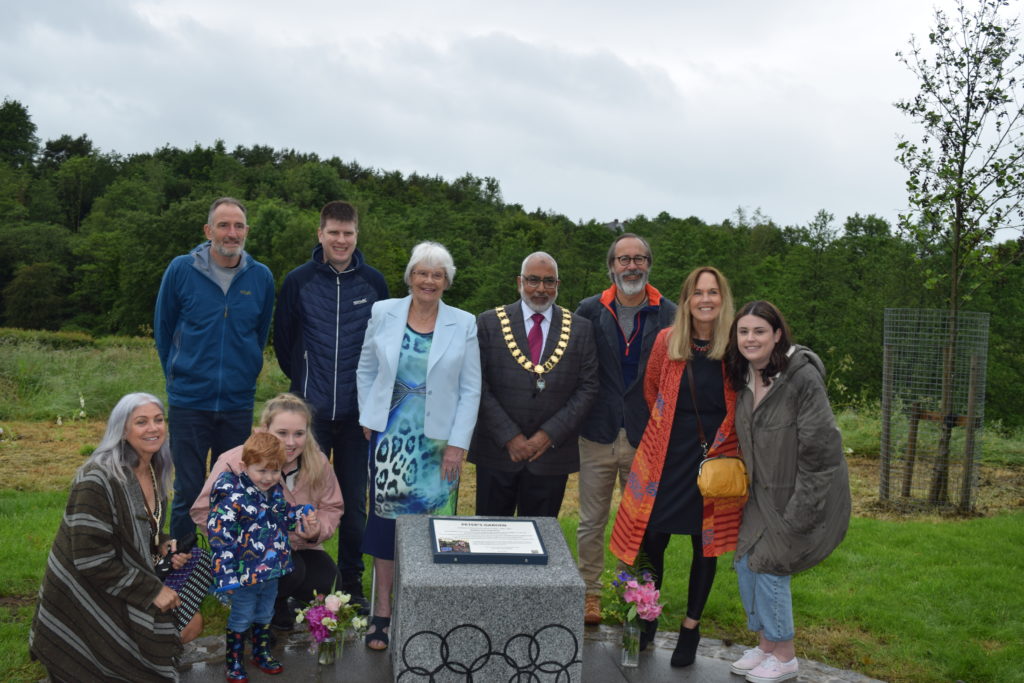
Mayor of Preston Javed Iqbal and Nora Ward and family at the opening ceremony of Peter’s Garden

Rest in Peace Pete
